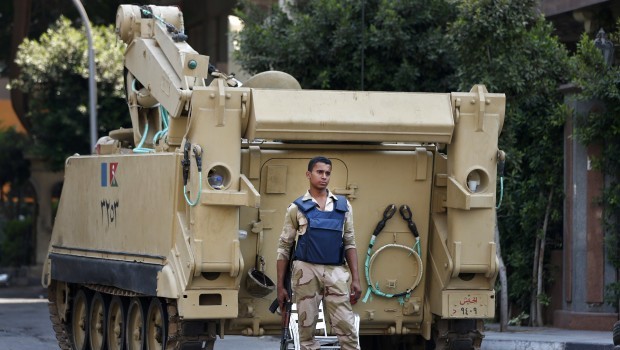
An Egyptian soldier stands guard next to an armored personnel carrier in Cairo, Egypt, on Tuesday, September 10, 2013. (AP Photo/Lefteris Pitarakis)
Cairo, Asharq Al-Awsat—On Thursday, the Egyptian government extended the nationwide state of emergency for two additional months due to the deteriorating security that saw a failed assassination attempt against the interior minister and growing violence against police and military facilities in the Sinai Peninsula.
Presidential spokesman Ihab Badawi made clear that the presidency extended the emergency laws after considering the security situation in the country, noting that the decree will come into effect from September 12 at 4:00 pm.
The current month-long state of emergency was imposed after the Egyptian military dispersed two key rallies in support of ousted president Mohamed Mursi in Cairo’s Raba’a Al-Adawiya and Al-Nahda squares in mid-August.
Criticizing Cairo’s move, the US called on Egypt’s military-backed government to lift the state of emergency and promote public freedoms.
US State Department deputy spokesperson Marie Harf said: “We remain opposed, as we have from the beginning, to the state of emergency. And we urge the interim government to end it immediately.”
In separate news, informed cabinet sources told Asharq Al-Awsat that the “government is heading towards easing the curfew so that it runs from midnight to 5:00 am, particularly since the school year will begin on September 21.”
The current curfew extends from midnight to 7:00 am.
“Postponement of lifting the curfew at this time will have a significantly positive effect on the gradual return of security in the country,” the source added.
Meanwhile, sources in the 50-member committee tasked with amending Egypt’s suspended constitution told Asharq Al-Awsat that the “majority of the members of the System of Governance [sub-]Committee are in favor of holding the forthcoming parliamentary elections according to individual-candidate system rather than the party-list system.”
The head of the System of Governance Sub-Committee, a subsection of the larger constitutional drafting committee, Mohamed Abou El-Ghar, told Asharq Al-Awsat he advocates the party-list system in order to “prevent any former regime [figures] from returning to and thus spoiling the political arena again.”
Ghar denied any claims he had a meeting with the Salafist Al-Nour Party over the divisive articles in the constitution, adding that there is a general trend among the members of the constitutional committee to maintain Article 2 in the constitution, which provides that Islamic Shari’a law is the main source of legislation.
The sub-committee’s deputy rapporteur, Mohamed Abdulaziz, said that there is a consensus among the members of the committee to endorse a mixed government system, although he said it has not been decided whether the government will be closer to a presidential or a parliamentary one.
According to the state-run Middle East News Agency (MENA), Egypt’s Coptic Pope Tawadros II demanded that the constitution’s third article be amended in a meeting with the head of the constitution committee Amr Moussa on Wednesday.
The third article of the suspended constitution stipulates that the “canon principles of Egyptian Christians and Jews are the main source of legislation for their personal status laws, religious affairs, and the selection of their spiritual leaders.”
The pope requested that “Egyptian Christians and Jews” be replaced with “non-Muslims,” MENA reported.
In another development, a Suez court acquitted all of the defendants accused of killing 17 and injuring around 300 protesters in Suez during the January 25 Revolution.
Among the defendants were the Suez’s security chief, Mohamed Abdulhadi, as well as the Egyptian businessman Ibrahim Faraj and three of his sons.
The verdict sparked the anger and resentment of the families of the dead and injured with some of them fainted upon hearing the ruling.
The spokesperson for the Suez victims’ families Ali Gunaidi said: “Today the blood of Egyptians has become cheap. The rulings that come out in Egypt are politicized.”
